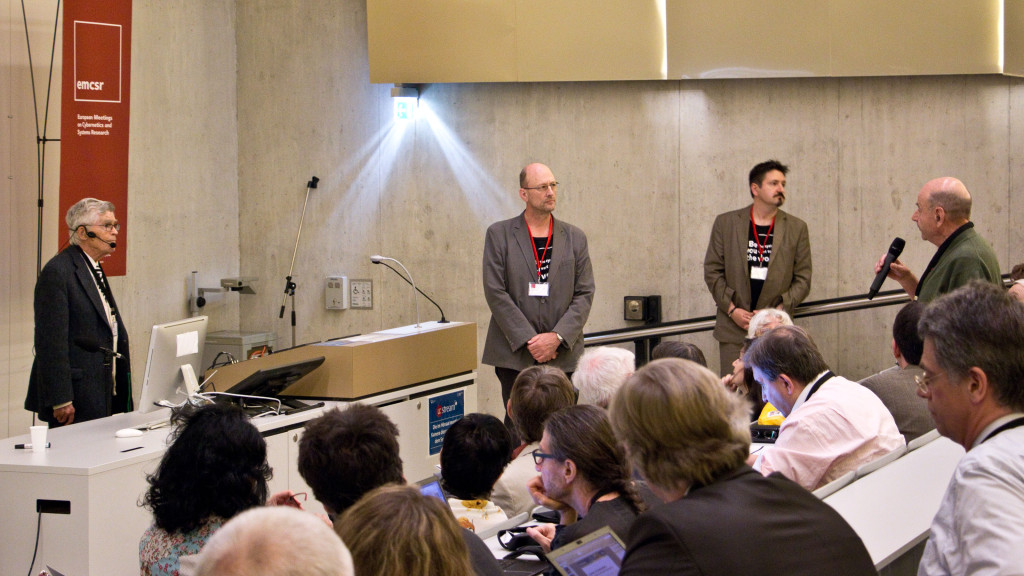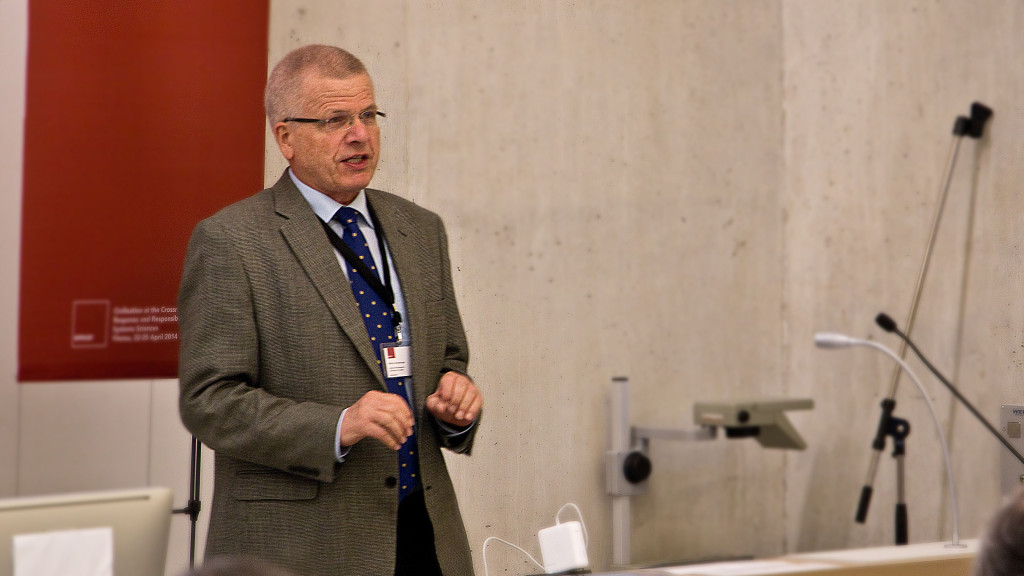2014 was a marvelous year for the EMCSR community. The 22nd European Meetings on Cybernetics and Systems Research took place from April 22nd to 25th, 2014 in the building of Communication Studies at the University of Vienna.
More than 170 contributions from international scientists and practitioners have been presented in the second year of the organization by the Bertalanffy Center for the Study of Systems Science. More than 200 attendees joined the meeting, which was especially designed to represent the scientific and social impact of systems scientists and their international networks. But most important these meetings enabled researchers and practitioners to start new collaborations and projects with even more possible impact!
Thus the meeting in 2014 united again the renowned organizations in this field of research with the support of the International Federation for Systems Research and the Vienna University of Economics and Business, with the participation of representatives of all the local universities of Vienna, Medical University of Vienna, University of Applied Arts Vienna, University of Natural Resources and Life Sciences (BOKU) Vienna, University of Vienna, Vienna University of Economics and Business (WU) and Vienna University of Technology (TU Wien).
Three central themes “Sustainability & Development”, “Emergence & Design” and “Strategy & Complexity” draw the bow of the current transdisciplinary approaches of systems sciences with contributions from the natural sciences, social sciences and technical sciences.
System scientists, philosophers, social scientists, economists, biologists, engineers and designers followed the call for a showcase of the most innovative solutions to the current global complex problems under the title “Civilisation at the Crossroads – Response and Responsibility of the system sciences”.
Mario Bunge from the McGill University, Montreal, Canada has been honoured with the 2014 Ludwig von Bertalanffy Award in Complexity Thinking.
Markus Schwaninger from the University of St.Gallen held the Ross Ashby Memorial Lecture on Organizing for Sustainability, traditionally sponsored by the International Federation for Systems Research.
Impactful systems science has been demonstrated by outstanding examples, including case studies of policy advice by the prestigious International Institute for Applied Systems Analysis (IIASA) from Austria and the Evolutionary Learning Labs supported by the Bill and Melinda Gates Foundation and their successful projects in Southeast Asia and Africa.
The meetings 2014, organized in 22 thematic symposia, included theoretical and practical reflections on: “Disasters prevention, Economic systems change, Impacts for sustainability, Corporate social responsibility, Social and environmental responsibility; Architectural ecologies, Urban systems research, Sustainability, ethics and the cyberspace, Game-based learning, Game Design, Emergent Design, Improving systemics for a better future, Ethics from systems, Emergence in social systems; Systemic consulting, Systemic project management, Country development, Risks in supply chain networks, Social and technical “volatility” in energy systems, Professional Systemics, Learning in a complex world, Transdisciplinary responses to global challenges, Crossroads of civilization.”
Furthermore the promotion of young scientific talents and the possibility of networking with the living founders of the system sciences build the core of the meeting. In 2014 the organiser Bertalanffy Center for the Study of Sytems Science sponsored again a special competition for outstanding research by doctoral students, co-organized with the International Academy for Systems and Cybernetic Sciences (IASCYS).
Katri-Liisa Pulkkinen with her thesis on “A bottom-up way of building a system and changing perceptions: urban pioneers as a model for transformation for sustainability” was awarded with the 1000 Euro prestige’s prize among the six selected nominated PhD candidates.
In 2012 the Bertalanffy Center set the goal to create a strong European hub for the international system sciences in Vienna, building on the EMCSR 40 years of tradition. Two years later this objective has been achieved. We were pleased to welcome guests from 24 European countries (Albania, Austria, Belgium, Croatia, Czech Republic, Denmark, Finland, France, Germany, Greece, Hungary, Italy, Ireland, Macedonia, Netherlands, Norway, Portugal, Russia, Slovenia, Spain, Sweden, Switzerland, Turkey, UK, and Ukraine), and from all regions of the world, like Asia (China, Israel, Japan, Malaysia, Nepal, Taiwan), Africa (South Africa), Australia, New Zealand and Americas (Argentina, Brazil, Canada, Chile, Ecuador, Peru, USA) in 2014.






